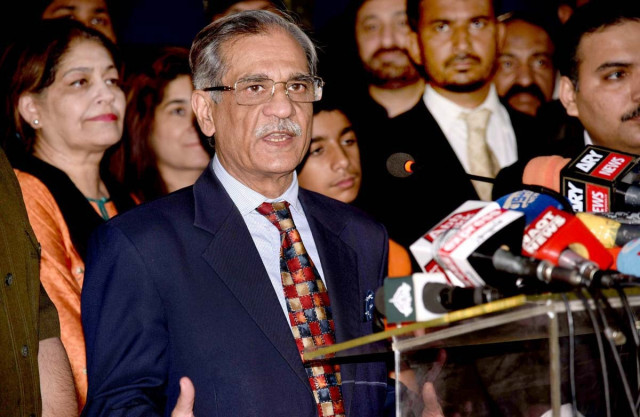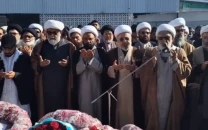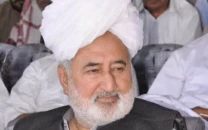Hudabiya mills case: CJP dismisses NAB plea for larger bench
Fixes review petition before the same three-judge bench

CJP Saqib Nisar. PHOTO: APP
The CJP has fixed the NAB review petition before the same three-judge bench led by Justice Mushir Alam and comprising Justice Qazi Faez Isa and Justice Mazhar Alam Khan Miankhel, which dismissed the bureau’s plea in December last year.
NAB to request review of Hudabiya verdict
A senior NAB official confirmed to The Express Tribune on Saturday that the application regarding the formation of a seven-judge larger bench to hear the anti-corruption watchdog’s review petition had been dismissed by the CJP, adding that the development was shared by the Advocate on Record (AoR) on Saturday.
The official revealed that though it was very difficult to argue a review petition before the same judges, they were hopeful about convincing the bench to reverse its earlier judgment. He said despite rejection of the application, NAB would again argue for the constitution of a larger bench to hear the matter.
The NAB in its application contended that a larger bench, consisting of five judges of the apex court, cast serious aspersions over the Hudabiya Paper Mills case, whereas the judgment under review, rendered by a three-member bench, took a different view from that of the larger bench in the Panamagate case in the April 20, 2017 judgment, and it was thus submitted that this was not in consonance with the settled legal and judicial principles and norms of law.
NAB referred a number of observations by Justice Asif Saeed Khosa to justify that there was a conflicting view among the SC judges regarding the reopening of the Hudabiya case.
“In order to resolve this anomaly, it will be just and proper to constitute a larger bench consisting of seven honourable members of this court for the hearing of this civil review petition,” says the application.
The application contends that the Hudabiya Paper Mills case has a direct nexus with the Panamagate scam. “Thus in the light of two divergent views expressed by two different benches of the apex court, the matter needs to be reconciled and it can only be done by placing the matter before a larger bench,” it added.
According to the application, “The statement of Ishaq Dar is inculpatory in nature and is a valid piece of evidence against the co-accused. Presence of the accused [the Sharif family members] at the time of recording the statement of Ishaq Dar was not necessary as his statement was being recorded as an approver and not an ordinary prosecution witness.”
Hudabiya case brings Sharif brothers closer
It says that the court discarded Dar’s statement on wrong premises as it was recorded before the magistrate after the grant of pardon by the NAB chairman, as required under Section 26 NAO 1999, as per prevailing practice of recording of statement of approver before the magistrate even in ordinary criminal cases, although not required by specific provision of CrPC.
The application states that under the Supreme Court rules, the state has a preferential right to file petitions against acquittal by extending the limitation of 30 days to 60 days which can be construed that the condonation of delay in cases against the acquittal should be made more liberally.
In its application, NAB contends that the quashing of the reference does not mean that the Sharifs have been acquitted of the charge; therefore, the criteria of acquittal would not apply and the principle of condonation of delay in these circumstances would have been dealt with differently.



















COMMENTS
Comments are moderated and generally will be posted if they are on-topic and not abusive.
For more information, please see our Comments FAQ